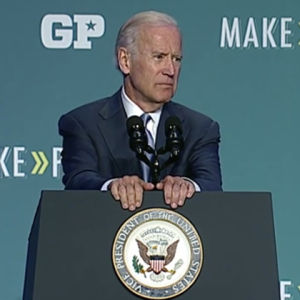Can Joe Biden get his green energy plan off — or rather “out of”— the ground?
Biden’s Build Back Better plan is a centerpiece of the Democratic presidential nominee’s campaign. If enacted, it would set the U.S. on a path to net-zero carbon emissions by 2050.
To get there, Biden would both invest in renewable energy while simultaneously disadvantaging coal, oil and natural gas. The end game would be producing enough of green tech — advanced batteries, parts and components — to build electric vehicles and battery packs for powering EVs and storing energy, and a vast network of EV charging stations, all right here in America.
The big question is whether clean energy and tech can really support the domestic economy and workforce. Rare-earth metals are a necessary element for making these batteries and other parts of clean energy and tech; but most of it is mined overseas, with China leading the way.
Biden has been emphasizing the made-in-America angle of his Build Back Better approach. The key stumbling block is that metals and other elements of solar, wind and lithium ion batteries have to be imported.
Currently, the vast majority is being mined overseas, according to a policy brief this year by conservative think tank Heartland Institute. That raises the cost of developing and producing the clean technology, and goes against supporting the domestic workforce and economy.
Finding enough rare-earth metals is the core challenge.
A 2018 report from the Dutch Ministry of Infrastructure warns that the renewable energy industry will need 12 times the current amount of some rare-earth metals to meet the goals of the Paris Agreement.
The U.S. has become dependent on importing these metals, and no rare-earth metals are currently processed in America. The Department of Defense is so concerned they’ve announced they will fund mines and processors through the Defense Production Act.
Currently, America’s supply– the supply needed to create Biden’s domestic green-energy industry — comes from all over the world — Canada, Germany, UK, France, Italy, Russia, China, India, Australia, Japan, Indonesia, Malaysia, Brazil, Mexico and the Gulf Cooperation Council (GCC) in the Middle East, according to GM Insights.
But China is the main source of rare-earth metals, particularly used in lithium-ion batteries, the mainstay for EV batteries. According to the Heartland Institute study, “more than 70 percent of the rare-earth minerals used in renewable energy sources are mined in China or by companies under Chinese control.”
Legislation co-authored by Republican Lance Gooden and Democrat Vicente Gonzalez, both of Texas, aims at reducing dependence on China for rare-earth elements used in several applications including EVs, missiles, and wind turbines. The bill that was introduced earlier this month, if enacted, would provide tax incentives for companies involved in the mining, reclaiming, and recycling of needed minerals and metals from deposits in the US.
“The tax incentive seeks to level the playing field with regard to the subsidies China provides from mine to magnet,” said Pini Althaus, chief executive officer of USA Rare Earth. “It would significantly improve the bottom line of any domestic rare earth project.”
Until the rare-earth issue is resolved, however, Biden’s “build in America” green politics could result in sending billions more dollars to China.

